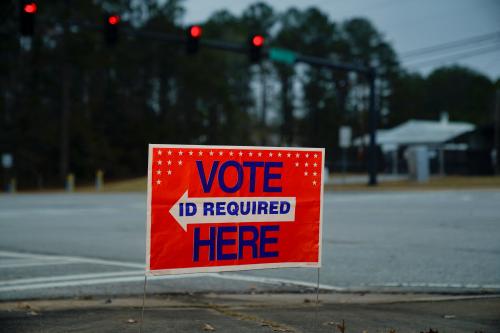I don’t expect there will be much foreign policy content in President Obama’s speech tonight — it would be atypical for a State of the Union speech in any year, but this year especially, observers expect a domestic focus. For more on the domestic agenda of the speech, please see the excellent work of our colleagues at Brookings’ FixGov blog.
To the extent that the Middle East features at all in the speech, there will be three major topics to address:
From the perspective of Congress and the American people, the biggest foreign policy issue to address is the fight against violent Islamist extremists who recently attacked in Paris, Yemen and Nigeria — and who inspired a young man from Ohio, allegedly, to plan an attack on the very Capitol Building in which the State of the Union will take place. With increasing numbers of U.S. forces back in Iraq as trainers and advisers, and with the United States embarking on a training mission for Syrian rebels, President Obama will want to tell Congress and the American people his view of how this fight will proceed, how long it will take, and what kind of American commitment it will involve. Moreover, achieving Congressional support for the anti-ISIS struggle through a new Authorization to Use Military Force is important to increase the president’s ability to wage this fight effectively, and to hand off the battle in a responsible manner to his eventual successor.
The second-most-likely Middle East issue to show up in tonight’s speech is Iran. I expect Obama will repeat his message that sanctions worked to pressure the Iranians to the table, and have worked to advance progress in the talks, but that adding more sanctions at this stage is more likely to torpedo the negotiations than to advance a solution to the threat presented by Iran’s nuclear program. The challenge for the president in making this argument is much greater than it was a year ago; the more time passes without a deal, the tougher it is for the administration to argue persuasively against ‘turning the screw’ through new sanctions.
Moreover, the more time passes, the more reasonable people can be pessimistic about a deal being achievable: the administration has so clearly and repeatedly articulated what it requires for a “good” deal, and that it won’t accept a ‘bad’ deal — so at a certain point, if Iran is not moving toward the compromises Obama has said are necessary, why keep hoping? Fundamentally, though, the administration wants to avoid new Congressionally-imposed sanctions because it worries about the impact of such a move on the international coalition that is confronting Iran, as much as on the Iranians themselves.
Whether a deal happens or not, that international coalition is what pressured Iran to the table so far, and what will keep Iran contained in the future. To preserve that coalition, it’s important that the United States be seen as acting in good faith and doing its utmost to achieve a negotiated outcome. In other words, Obama doesn’t want the United States to be seen as the spoiler by its partners in the talks with Iran.
Will the president even mention the Israeli-Palestinian issue, which occupied so much of his administration’s diplomatic energy a year ago? I expect there will be some — probably very brief — reference to it. With the collapse of the U.S.-led negotiations, he’ll want to emphasize the U.S. view that a negotiated two-state solution remains the only stable, peaceful path for both sides. In that regard, it’s possible he’ll explicitly criticize the Palestinian move to join the International Criminal Court — his spokesmen have been resoundingly critical on the subject already.
But I would be surprised if the president will address new Congressional proposals to revoke aid to the Palestinians unless they abandon their International Criminal Court bid. After all, he and Congress agree on the principle that the conflict should be solved and a Palestinian state established only through negotiations — the question is how to achieve that objective.
All of the above is to say that there will be very little Middle East news out of tonight’s annual ritual, and not much fodder for Washington’s annual drinking game. Appropriate, since the region’s policy dilemmas are nothing these days if not sobering.



Commentary
State of the Union 2015: Sobering Dilemmas for Obama’s Middle East Policy
January 20, 2015